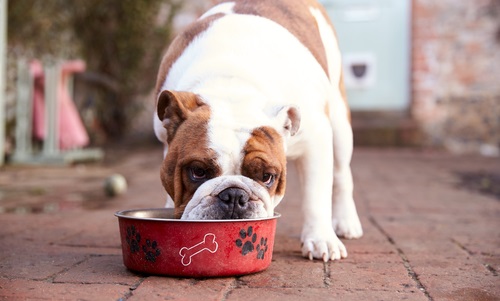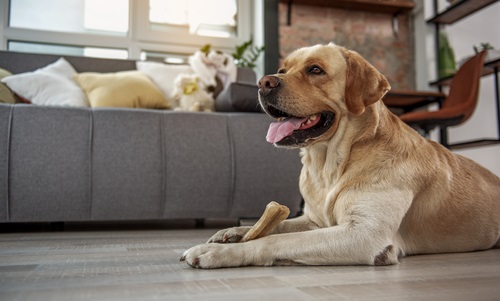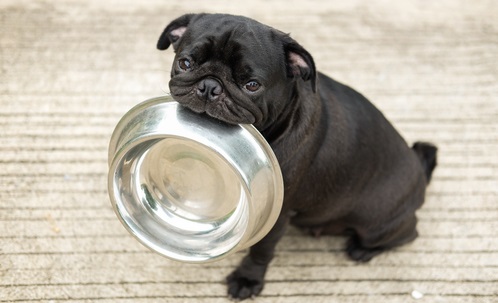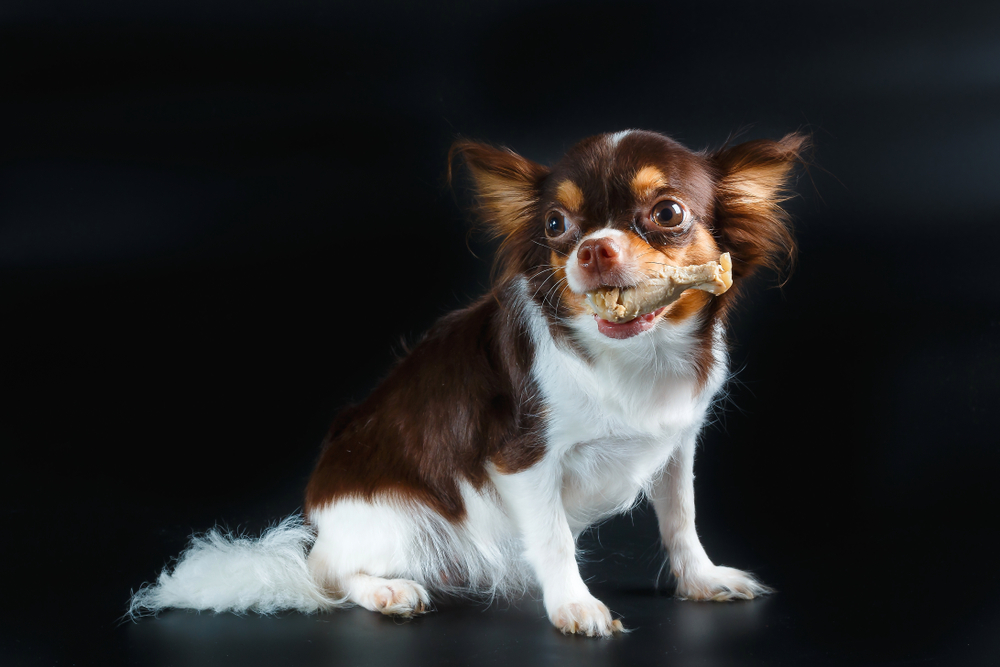For even the best-intentioned pet parents, this unfortunate occurrence is all too common: one moment, the family dog is in clear sight, and the next, he’s somehow gotten ahold of a chicken bone from the garbage can (or off the dinner table). Whether he comes across one at home or even out on a walk, chicken bones can pose a dangerous health hazard to domestic dogs, especially once they are cooked.
Whereas wolves and wild dogs eat bones in nature – and raw bones are not as apt to splinter as cooked bones – these outdoor canines are also consuming fur along with the bones, which acts as a padding around them (and makes passing them much easier). Since they’re raw, they are processed uneventfully as the bones pass through their digestive systems, and result in white stools. Unlike their wild canine brethren, it isn’t in a domesticated dog’s best interest to consume chicken bones – particularly if they’re swallowed whole – as they can potentially puncture or scrape his insides, as well as lead to an intestinal blockage. To find out what to do if your dog eats a chicken bone, read on.
Help! My Dog Ate A Chicken Bone: Now What?
 It’s a natural instinct for any dog to want to consume meat – they are carnivorous animals, after all. If a dog chews a chicken bone carefully and swallows it without any issue, he might be okay – even domestic dogs are equipped with adequate teeth capable of grinding up such a tasty treat. However, chomping on chicken bones becomes especially problematic for a pet pooch when he decides to swallow one whole – either because he knows he’s going to get scolded, or he simply has a tendency of wolfing down his food. Either way, if a dog is suspected of accidentally ingesting a chicken bone, pet parents should keep a watchful eye and respond accordingly. Remaining proactive in this case is essential, as swallowing a chicken bone whole can lead to injury or even become fatal if left untreated. Below are some tips to help you decide what to do if your dog eats a chicken bone.
It’s a natural instinct for any dog to want to consume meat – they are carnivorous animals, after all. If a dog chews a chicken bone carefully and swallows it without any issue, he might be okay – even domestic dogs are equipped with adequate teeth capable of grinding up such a tasty treat. However, chomping on chicken bones becomes especially problematic for a pet pooch when he decides to swallow one whole – either because he knows he’s going to get scolded, or he simply has a tendency of wolfing down his food. Either way, if a dog is suspected of accidentally ingesting a chicken bone, pet parents should keep a watchful eye and respond accordingly. Remaining proactive in this case is essential, as swallowing a chicken bone whole can lead to injury or even become fatal if left untreated. Below are some tips to help you decide what to do if your dog eats a chicken bone.
- If dog is choking or showing other signs of distress: First and foremost, bring the family pouch to a trusted veterinarian or animal clinic immediately, especially if your dog is choking, showing signs of labored breathing, abdominal bloating, isn’t eating, or displaying any other outward signs of distress or discomfort.
- If dog seems fine, but the owner is uncertain if he’s in the clear: Just because the dog may have begun to digest a bone he’s swallowed and appears okay, doesn’t mean he won’t suffer from the obstruction later in his lower intestines. In this case, call the vet right away and ask if it is safe to monitor his progress at home. Pet owners may also wish to ask the vet’s office if feeding him (see list below) can help him pass the offending bone, and based on the animal’s symptoms, if the dog needs to be taken to the vet right away and/or if other things can be done at home until the dog can be brought in for an examination. According to the AKC, “Check your dog’s stool daily to see if you can see the bone fragments passing through. If you do not see them within 72 hours after ingestion (or whatever time frame is recommended by your veterinarian), it’s a good idea to visit the vet to make sure the bones aren’t stuck in your dog’s intestine, esophagus or throat.”
Here are some steps every owner should know to ensure a dog’s safety (and prevent potential injury or physical harm) if he happens to swallow a chicken bone:
1) Create a protective “cushion” of food: By feeding the affected dog with certain high-fiber foods, owners can create a protective “pillow” of food that protects his digestive tract as it passed through his system, potentially preventing tears and lacerations. Always check with a vet first before administering this at-home treatment.
2) Never induce vomiting: Because a dog’s esophagus is fragile and more prone to tears than his intestinal tract, canine vomiting could actually cause the animal more damage.
3) Keep a watchful eye: For owners who think their dog may have swallowed a chicken bone, keep an eye on him – even if he appears fine at first, it’s important to see if he displays any delayed symptoms of distress or potential issues, such as:
In the event that any of these symptoms are observed, a vet should be contacted immediately.
What To Feed Dogs To Help Them Pass Ingested Bones
 According to the experts, the key to helping a dog who’s swallowed a bone can actually be feeding him – but it has to be the right type of food; as you’ll note, all of the foods listed are high in fiber. The trick is to create a “pillow” with the appropriate food in an attempt to prevent punctures/lacerations as it passes through his digestive system. Some safe foods to achieve this include:
According to the experts, the key to helping a dog who’s swallowed a bone can actually be feeding him – but it has to be the right type of food; as you’ll note, all of the foods listed are high in fiber. The trick is to create a “pillow” with the appropriate food in an attempt to prevent punctures/lacerations as it passes through his digestive system. Some safe foods to achieve this include:
- A slice of high-fiber bread (torn up into small pieces)
- ½ cup of plain canned pumpkin (not the pie filling version – the kind without spices)
- ¼ – ½ cup of cooked brown rice
Before administering any food to the affected dog, be sure to consult a vet first.
Looking Ahead: Taking Preventative Measures
 The dog is okay, and the vet gave him a clean bill of health – but after such an ordeal, most pet parents will not want a repeat of this scenario described above. Therefore, one of the best methods of avoiding this sort of incident is prevention. While it’s nearly impossible to keep an eye on dogs every single hour of the day, there are certain measures that can be taken to protect him, both at home and while he’s out at a park or going for a walk:
The dog is okay, and the vet gave him a clean bill of health – but after such an ordeal, most pet parents will not want a repeat of this scenario described above. Therefore, one of the best methods of avoiding this sort of incident is prevention. While it’s nearly impossible to keep an eye on dogs every single hour of the day, there are certain measures that can be taken to protect him, both at home and while he’s out at a park or going for a walk:
- Train dogs not to steal food from counter or dining area
- Discourage dogs from picking up food and other waste when on walks (commands such as “drop it” and “leave it” are often effective)
- Keep garbage cans and other waste baskets securely closed at all times
- Keep food out of reach whenever possible
- Watch where family and guests leave their food (to avoid potential scavenging)
By following these helpful tips, you’ll be able to prevent another bone-eating scenario and help keep your dog happy and healthy.
Sources Cited:
- Farricelli, Adrienne. “What Should I Do If My Dog Ate Chicken Bones?” Pet Helpful.com, May 28, 2019, https://pethelpful.com/dogs/What-to-do-if-Dog-Ate-Chicken-Bones. Accessed November 26, 2019.
- Lowrey, Sassafras. “Your Dog Ate a Chicken Bone – Here’s What to Do.” Dogster.com, February 8, 2019, https://www.dogster.com/dog-health-care/your-dog-ate-a-chicken-bones-heres-what-to-do. Accessed November 26, 2019.
- Finlay, Katie. “What to Do if Your Dog Eats a Chicken Bone.” American Kennel Club (AKC.org), June 22, 2017, https://www.akc.org/expert-advice/health/what-to-do-dog-eats-chicken-bone/. Accessed November 26, 2019.




